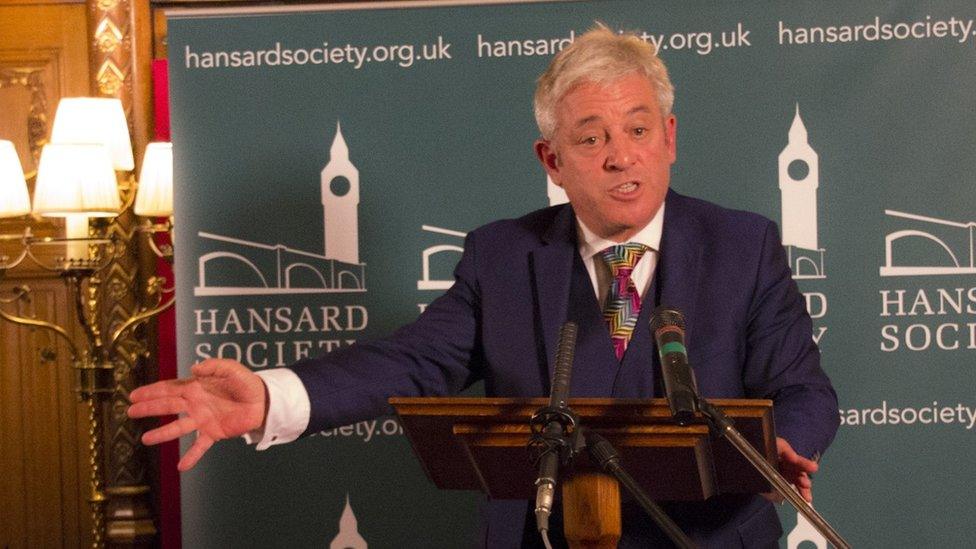Speaker calls for rethink on private members' bills
- Published

The Commons Speaker, John Bercow, has suggested the system by which backbench MPs bring in legislation needs to be overhauled.
At present, private members' bills receive limited debate on Fridays and they stand little chance of becoming law without government support.
It is common for MPs opposing such a bill to talk at length until it runs out of time.
Mr Bercow said this situation "has not enhanced the reputation of the House".
Talking out: How MPs block bills
Calling time on private members' bills?
Speaking at a Hansard Society event, he called for MPs to debate an alternative process.
What could happen instead?
The Speaker highlighted recommendations previously made by the , including:
moving private members' bills from their traditional Friday sitting, when MPs often return to their constituencies
introducing a "peer group review" with the aim of ensuring fewer, higher-quality bills
enabling time limits on speeches in such debates.
The Speaker acknowledged the argument used by those who talk out bills, that the legislation should not pass if its sponsor cannot muster the support of 100 MPs to turn up on a Friday and vote with them.
This refers to a closure motion, which can be used to stop a bill being talked out - but only if 100 MPs are there to vote for it.
Conservative Philip Davies is one of a number of MPs who have been accused of standing in the way of private members' bills
But he went on to say this should not prevent MPs from discussing how to reform the practice.
He said: "The brutal truth is that today while we set aside 13 sitting Fridays for 20 such bills, the chances of any more than a handful becoming law are meagre.
"The talking out of bills, though done both within our rules and often with destructive skill, has not enhanced the reputation of the House."
What do MPs think?
Conservative Philip Davies, who has been criticised for talking out bills, told the “óĻó“«Ć½: "If I had my way I'd abolish all private members' bills which are usually well-meaning but terribly drafted.
"Nobody apart from me and a handful of others have the courage to speak out against them.
"But if we are going to have them I think the current system works quite well - the rules quite rightly mean a small minority can neither block nor force through a bill."
Labour's Nick Thomas-Symonds, whose bill on off-patent drugs was talked out in 2015, disagrees, saying: "The spectacle of the filibuster demeans Parliament in the eyes of the public and I do think it needs to change."
Parts of his bill were later adopted in legislation but he says it was "extraordinarily difficult" to get there, leaving him convinced that "the executive is very dominant and the limited means for MPs to make an impact need to be protected".
In his speech, the Speaker also raised the need to consider new mechanisms for deciding Parliament's overall timetable and for recalling Parliament during recess.
He admitted that the chances of time being found for these questions against the backdrop of Brexit were "fifty-fifty" but said he was nonetheless "optimistic".
- Published7 November 2016
- Published20 April 2016